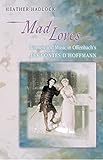Mad Loves : Women and Music in Offenbach's Les Contes d'Hoffmann / Heather Hadlock.
Material type: TextSeries: Princeton Studies in Opera ; 35Publisher: Princeton, NJ : Princeton University Press, [2014]Copyright date: ©2000Description: 1 online resource (176 p.)Content type:
TextSeries: Princeton Studies in Opera ; 35Publisher: Princeton, NJ : Princeton University Press, [2014]Copyright date: ©2000Description: 1 online resource (176 p.)Content type: - 9780691058023
- 9781400866724
- online - DeGruyter
- Issued also in print.
| Item type | Current library | Call number | URL | Status | Notes | Barcode | |
|---|---|---|---|---|---|---|---|
 eBook
eBook
|
Biblioteca "Angelicum" Pont. Univ. S.Tommaso d'Aquino Nuvola online | online - DeGruyter (Browse shelf(Opens below)) | Online access | Not for loan (Accesso limitato) | Accesso per gli utenti autorizzati / Access for authorized users | (dgr)9781400866724 |
Frontmatter -- Contents -- Acknowledgments -- Introduction -- CHAPTER ONE. Telling the Tales -- CHAPTER TWO. Mesmerizing Voices -- CHAPTER THREE. Song as Symptom -- CHAPTER FOUR. Offenbach, for Posterity -- CHAPTER FIVE. Reflections on the Venetian Act -- Notes -- Bibliography -- Index
restricted access online access with authorization star
http://purl.org/coar/access_right/c_16ec
In a lively exploration of Jacques Offenbach's final masterpiece, Heather Hadlock shows how Les Contes d'Hoffmann summed up not only the composer's career but also a century of Romantic culture. A strange fusion of irony and profundity, frivolity and nightmare, the opera unfolds as a series of dreamlike episodes, peopled by such archetypes as the Poet, the Beautiful Dying Girl, the Automaton, the Courtesan, and the Mesmerist. Hadlock shows how these episodes comprise a collective unconscious. Her analyses touch on topics ranging from the self-reflexive style of the protagonist and the music, to parallels between nineteenth-century discourses of theater and medical science, to fascination with the hysterical female subject. Les Contes d'Hoffmann is also examined as both a continuation and a retraction of tendencies in Offenbach's earlier operettas and opéra-comiques. Hadlock investigates the political climate of the 1870s that influenced the composer's vision and the reception of his last work. Drawing upon insights from feminist, literary, and cultural theory, she considers how the opera's music and libretto took shape within a complex literary and theatrical tradition. Finally, Hadlock ponders the enigmas posed by the score of this unfinished opera, which has been completed many times and by many different hands since its composer's death shortly before the premiere in 1881. In this book, the "mad loves" that drive Les Contes d'Hoffmann--a poet's love, a daughter's love, erotic love, and fatal attraction to music--become figures for the fascination exercised by opera itself.
Issued also in print.
Mode of access: Internet via World Wide Web.
In English.
Description based on online resource; title from PDF title page (publisher's Web site, viewed 29. Jul 2021)


